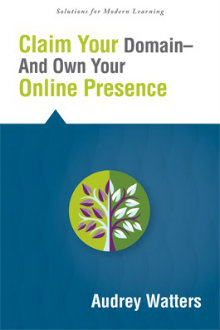Should Students Have Personal Web Domains?
Claim Your Domain – And Own Your Online Presence
By Audrey Watters
(Solution Tree Press, 2016 – Learn more)
Audrey Watters begins her book by telling the story of a manila envelope that her mother gave to her. Inside were all of her school projects and significant papers she’d done as a young girl in grade school and high school. The author compares this manila envelope to today’s world where the majority of student work is done electronically.

Watters argues persuasively that students should have more control over their own data and the work that they do on a computer or other electronic device.
Watters’ solution to this problem is for every student to own their own domain (hence the title of the book). A “domain” refers to a space on the web that is controlled by that individual so that they can do what they want with their data in their own space.
Watters argues that each student’s domain should not be censored by anyone, and she says it will allow for each individual to choose how they want to share their work with others.
Important questions
While this book makes some insightful points, it is not a very practical book for teachers or school administrators. With that said, the questions that Watters raises are important for educators to consider, especially administrators and decision makers within large school districts and education technology organizations.
When schools are choosing which LMS to use and what sort of platforms to provide for students and staff, these questions ought to be part of the consideration process. Will students’ personal data be given to a large technology firm in order for that data to be “mined” so that the firm can profit from the data? Will student data be handed over to marketers so they can learn more about how to sell products to students?
Read Audrey Watters’ essay on A Domain of One’s Own
Here’s where I disagree
I do not agree with Watters that every student ought to own their domain. There is something to be said for the web to be more of a communal place. A lot of Watters’ ideas seem to come from an individualistic and even self-centered way of viewing the world. Is it really necessary for every person to own www.insert-your-name.com?
Watters seems to believe that every student should be able to do whatever they want online without accountability. I would say that students should be able to keep their work after they graduate. That is very important; however, the responsibility lies with the student and not the school or the teachers to ensure that each student has their own private domain on the internet and that the student leaves school with all of their work organized and saved.
I also think Watters does not give enough credit to some ed tech giants like Google who do allow students to download all of their data at any time. Going forward I believe educational leaders should try to make an effort to allow students to retain their work if they want beyond their time in school.
In my case, I recently graduated with an MA from Fuller Theological Seminary and I was pleasantly surprised to learn that, although I was no longer an active student, I could keep my fuller.edu email address for life! This email comes with Google apps and over 1TB of storage on Google Drive! The email address also connects me to the Graduate School Community because when I type the name of any person at the school it pulls up his/her email address.
How do we gain a domain?
I wish Watters provided more details and specifics about how to buy your own domain. She does provide some general information in the appendix of the book, but it doesn’t really answer many of the questions that I have about the process (since I do not own my own domain at the moment and I haven’t been through the process of getting one).
I understand that the focus of this book is not how to claim your own domain; it is rather an argument that everyone should claim their own domain. Even so, I think more “how to” information would have been helpful so that readers who agree with Watters’ arguments can get started acquiring their own domain right away.
While I do not recommend this book for teachers (unless a teacher has a specific interest in how “big data” is used in education or the debate over the rights of students to own their electronic data), I would recommend the book to policy makers and stakeholders at the school district level who are making policy decisions in this arena, including which types of online platforms to use for students and staff.
Caleb Pahl (@calebpahl) is a husband and father. He has past experience in higher education as Academic Dean at Inste Bible College. He has recently relocated to the nation of Panama to teach Middle School Social Studies at Crossroads Christian Academy. He enjoys sports and walks with his wife on the beach.



































